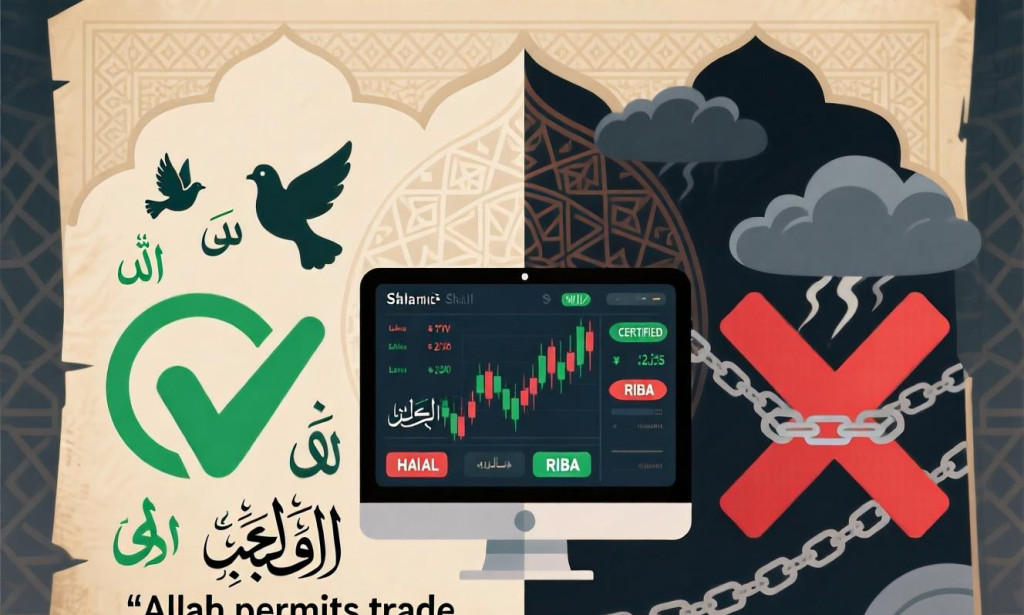Forex Trading in Islam: Halal or Haram?
Introduction:The foreign exchange market (Forex) is the most liquid financial market in the world, with trillions of dollars traded daily. Many Muslims are drawn to it because of the opportunity to earn income from currency fluctuations. However, before engaging in Forex, one important question must be asked: Does Forex trading comply with Islamic law, or does it fall into the category of haram?
Islam places strict conditions on financial transactions. Trade must be transparent, free from riba (interest), and must avoid gharar (excessive uncertainty) and maysir (gambling). This article examines both sides of the discussion, showing when Forex is halal and when it becomes haram, using examples for clarity.
When Forex Trading is Considered Halal
1. Spot Trading with Immediate Settlement, Islam permits the exchange of one currency for another as long as it is done immediately.
Example: A trader buys EUR/USD, and the broker settles the transaction instantly into the trading account. Since the exchange is “hand-to-hand,” it fulfills the hadith of the Prophet ﷺ:
“Gold for gold, silver for silver, equal for equal, hand to hand. If they differ, then sell as you wish, provided that it is hand to hand.” (Sahih Muslim 1587)
This shows that instant settlement is the key condition for halal currency exchange.
2. Riba-Free Trading Accounts: One of the most common issues in Forex is the swap fee (interest charged for holding trades overnight). In Islam, riba is strictly prohibited:
“Allah has permitted trade and has forbidden riba.” (Qur’an 2:275)
To solve this, many brokers offer Islamic or swap-free accounts where no interest is charged.
Example: Broker A charges a 2% overnight fee on open trades → haram. Broker B provides a swap-free Islamic account → halal, because it avoids riba.
3. Knowledge-Based Trading, Not Gambling: Islam encourages fair business and discourages speculation based on luck. If a trader studies charts, news, and uses skill-based analysis, then Forex resembles regular business.
Example: A Muslim trader invests after analyzing economic data, not just “betting” on random price moves.
4. Clear Contracts and Ownership: The Qur’an commands fairness:
“Do not consume one another’s wealth unjustly, but only [in lawful] trade by mutual consent.” (Qur’an 4:29)
If the contract terms are clear, the trader owns the currency, and profits/losses are transparent, then Forex can remain within halal limits.
When Forex Trading Becomes Haram
1. Interest (Riba) in Accounts: If the account includes interest, whether charged or paid, the transaction becomes haram.
Example: A trader holds a position overnight and earns an interest payment from the broker → haram.
2. Excessive Speculation (Gharar): Islam prohibits business based on extreme uncertainty.
Example: A trader randomly buys and sells currencies without knowledge, relying only on chance → this resembles gambling, not business.
3. Leverage as Gambling (Maysir): Leverage allows traders to control large amounts of money with little capital. While moderate leverage can be a tool, excessive leverage often leads to gambling-like behavior.
Example: A trader with $100 uses 1:1000 leverage to trade $100,000. A tiny price movement can wipe out the account → this resembles gambling (maysir).
4. Futures, Forwards, and Options: These contracts are often settled in the future and involve speculation. Since there is no actual hand-to-hand exchange, most scholars classify them as haram.
Example: Buying a USD/JPY futures contract to be settled after three months is not immediate, so it is not halal.
Scholarly Perspectives: Permissible with conditions: Some scholars allow Forex if it is limited to spot trading, free of riba, and transparent.
Not permissible: Others say the high speculation, leverage, and risks make Forex too close to gambling.
The Islamic Fiqh Academy and various Shariah boards advise Muslims to only trade in halal conditions, using Islamic accounts and avoiding speculation.
Case Study: Two Traders
Trader A (Non-Islamic Account): He deposits $1,000 in a regular Forex account. He holds a trade overnight and pays $5 in swap fees. This $5 is riba → his trading is haram.
Trader B (Islamic Account):
She deposits $1,000 in a swap-free Islamic account. She trades only in spot markets, avoids excessive leverage, and bases decisions on analysis. Her trading is considered halal.
This comparison shows how the choice of account and trading style can determine whether Forex is permissible.
Conclusion: Forex trading in Islam depends on how it is practiced. If it involves spot trading, free of interest, with transparency and responsibility, it is halal. But if it includes riba, gambling-like speculation, or delayed settlement contracts, it is haram.
The Prophet ﷺ taught:
“Leave what makes you doubt for what does not make you doubt.” (Sunan al-Tirmidhi 2518)
For Muslims, the safest option is to use Islamic accounts and trade with discipline, keeping their income free from prohibited elements.


You must be logged in to post a comment.